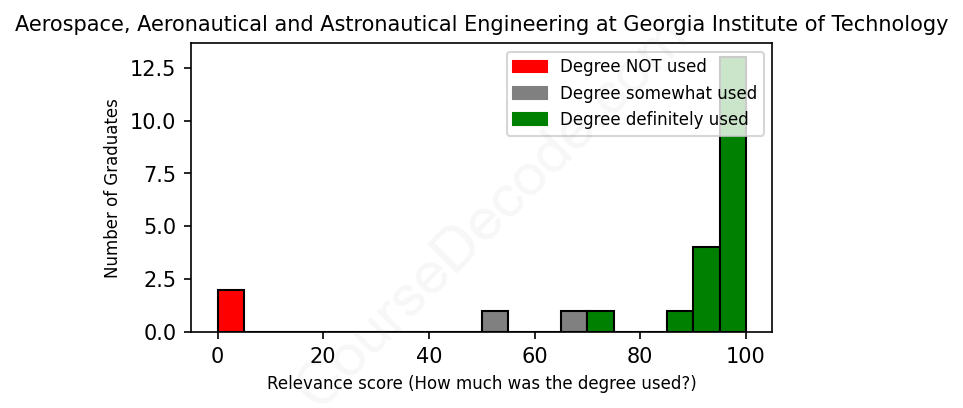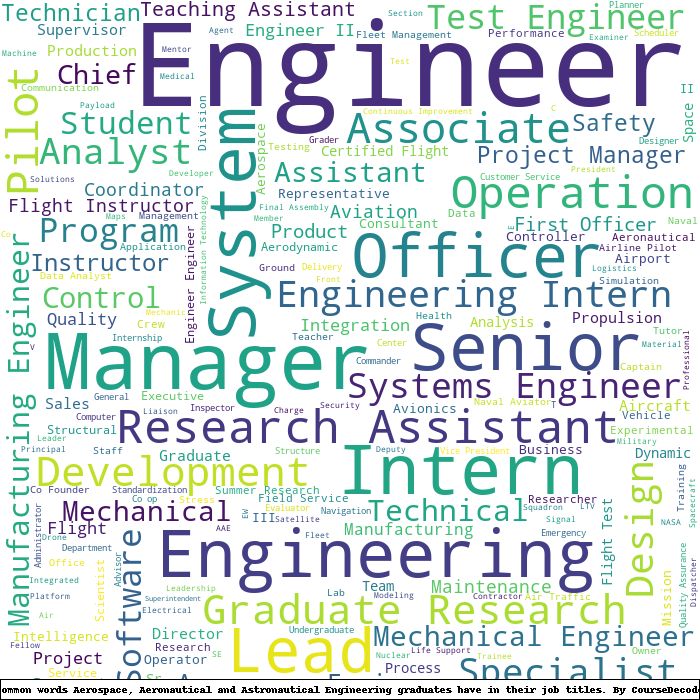
First, some facts. Of the Aerospace, Aeronautical and Astronautical Engineering graduates from Georgia Institute of Technology we've analyzed , here's how many have used (or NOT used) their degree in their career:

These are estimates based on AI analysis of 23 LinkedIn profiles (see below).
The verdict? Significantly above average. Overall, with an average relevance score of 84%, Aerospace, Aeronautical and Astronautical Engineering graduates from Georgia Institute of Technology have a much higher likelihood (+17%) of finding work in this field compared to the average graduate across all fields:
And for comparison, here's the chart for all profiles we've looked at across all degrees.
Also, after graduating, 56% of these graduates have pursued further education other than another Bachelor's degree (such as a Masters degree or other), compared to the average across all profiles of 35%. This suggests you may need more than just a Bachelors degree to be competitive as a Aerospace, Aeronautical and Astronautical Engineering graduate.
See the details:
|
Relevance score: 92% We think this person has gone into a career highly relevant to their degree. We think this person has gone into a career highly relevant to their degree.
DEGREE INFOGraduated in 2013 from Georgia Institute of Technology with a Bachelor's Degree in Aerospace Engineering with Research Option in Aerospace, Aeronautical and Astronautical Engineering. Also pursued further education since (see below). JOB HISTORY SINCE GRADUATIONProgram Manager Research - Reconnaissance of Space Objects Jan 2013 - May 2013 Data Analytics  Data Science Course Project Apr 2014 - Dec 2014 Graduate Research Assistant  Research - Self-consuming Satellites Aug 2014 - Dec 2016 Business Analyst Lead  Northrop Grumman Corporation Jul 2013 - Jul 2017 Associate  Apogee Integration, LLC Aug 2017 - May 2019 Senior Associate  Apogee Integration, LLC May 2019 - Feb 2023 Data Science Specialist  Multispective Solutions, LLC Mar 2023 - Aug 2023 AI/ML Engineer  Summit Systems Consulting Sep 2023 - Present FURTHER DEGREES DONE SINCE GRADUATINGMaster's DegreeThe George Washington University 2014 - 2016 Data Science Specialization The Johns Hopkins University 2014 - 2015 Deep Learning Specialization Stanford University 2021 - 2021 Remote Sensing Image Acquisition, Analysis, and Applications Certificate UNSW 2023 - 2023 ABOUTOne can never consent to creep when one feels an impulse to soar - Helen Keller.My childhood-cherished dream is expressed very eloquently by Helen Keller. My love of flying and quest for space exploration has gotten me a private pilot license at an early age of 17 and a Bachelor of Science degree in Aerospace Engineering with undergraduate thesis in Thermoelectric Power Generation Systems from Georgia Institute of Technology and my Masters of Science degree in Aerospace Engineering with thesis in 'Self-Consuming Satellites' from George Washington University.I am always interested in hearing from former colleagues, professors, managers, or interesting creative folk, so feel free to contact me if youd like to connect and talk technology, research, business, flying, or Doctor Who.Research Interests: My research interests lie in Space Architecture, Space Exploration, Space Systems and Design, Propulsion, Flight Research, Artificial Intelligence, and Machine Learning. |
The top 10 most common jobs done by the graduates we've analyzed (ranked most common to least) are:
When looking at the job profiles of graduates from Georgia Institute of Technology with degrees in Aerospace, Aeronautical, and Astronautical Engineering, it's clear that there are two distinct paths they tend to take after graduation. A significant number of them work in positions that are directly relevant to their field, such as Engineers at major aerospace companies like GE Aviation, Boeing, and Lockheed Martin. These roles frequently insist on practical applications of their degree, whether it's through tasks related to engine performance, aerodynamics, propulsion, or even research in advanced aerospace concepts. For these graduates, their jobs provide a strong connection to what they studied, often involving hands-on work and deep technical expertise.
However, there is also a noticeable proportion of graduates who stray from the aerospace path, finding jobs in other industries that don’t heavily involve their specialized training. For example, roles in business management, customer service, and positions like software engineers or instructors at language schools typically do not require extensive aerospace knowledge. While some of these positions may still utilize general problem-solving skills or analytical thinking acquired during their education, they aren’t directly linked to the aerospace field. Overall, while many Georgia Tech aerospace graduates find relevant jobs utilizing their technical skills, there’s also a notable group working in areas that, frankly, don’t align as closely with their degree—a mixed bag that showcases how diverse opportunities can be, even beyond the expected aerospace tracks!
Here is a visual representation of the most common words in job titles for Aerospace, Aeronautical and Astronautical Engineering graduates (this is across all Aerospace, Aeronautical and Astronautical Engineering graduates we've analyzed, not just those who went to Georgia Institute of Technology):

Overall, graduates from Georgia Tech's Aerospace, Aeronautical, and Astronautical Engineering program seem to have solid career trajectories, especially in their early years right after graduation. A number of them land jobs with major players in the aerospace sector, like Boeing, GE Aviation, and NASA. Common first roles include engineering and internship positions, particularly focusing on specific areas like propulsion and structural engineering. This trend indicates that many graduates are effectively utilizing their education in relevant fields right out of school. For example, graduates from 2015 and 2020 have secured key roles in powerful companies like Boeing and Axiom Space, highlighting the credibility of their degree in the job market.
As for their careers 5 to 10 years later, many alumni continue to advance within the aerospace industry, taking on more significant responsibilities or transitioning into management roles. For instance, individuals from the 2010 and 2015 cohorts have climbed the ranks at GE Aviation and Boeing, respectively. However, there are some who have ventured outside traditional aerospace avenues, like the 2012 graduate who became involved in mosquito control and later corporate training. Although this divergence isn't the norm, it suggests that some graduates might explore different fields or entrepreneurship. Overall, while there are a few exceptions, it appears that most Georgia Tech aerospace graduates are faring well and remain closely aligned with their engineering roots in reputable aerospace and engineering organizations.
Getting a Bachelor’s degree in Aerospace, Aeronautical, and Astronautical Engineering at Georgia Tech is definitely on the challenging side. The program is known for being rigorous and demanding, with a heavy emphasis on advanced math, physics, and problem-solving skills. You’ll dive into complex topics like fluid dynamics, propulsion, and structural mechanics, which can be pretty tough if you’re not ready for it. Plus, the coursework tends to be fast-paced, often requiring long hours of studying and projects. Overall, if you’re passionate about the field and willing to put in the effort, it can be really rewarding, but it’s kind of a workout for your brain compared to many other degrees out there!
Most commonly, in the LinkedIn profiles we've looked at, it takes people 4 years to finish a Bachelor degree in Aerospace, Aeronautical and Astronautical Engineering.
Alright, so let's break this down. It looks like a good chunk of these Georgia Tech grads in Aerospace, Aeronautical, and Astronautical Engineering have landed some pretty solid jobs since graduating. For instance, those who went to work at big companies like GE Aviation, Boeing, and NASA are likely making some serious bank, especially with the experience they’ve accumulated over the years. Even the ones in tech roles, like software engineers at Amazon and Coalition, are probably raking it in because those positions generally pay well. On the flip side, a couple of grads have taken paths with less conventional roles or started in entry-level jobs, which might not pay as high right out of school. Overall though, it seems like most of these folks are doing pretty well financially, especially considering the strong reputation of Georgia Tech in engineering fields!
Here is a visual representation of the most common words seen in the "about" section of LinkedIn profiles who have a Bachelor degree in Aerospace, Aeronautical and Astronautical Engineering (this is across all Aerospace, Aeronautical and Astronautical Engineering graduates we've analyzed, not just those who went to Georgia Institute of Technology). This may or may not be useful:

Here are all colleges offering a Bachelor degree in Aerospace, Aeronautical and Astronautical Engineering (ordered by the average relevance score of their Aerospace, Aeronautical and Astronautical Engineering graduates, best to worst) where we have analyzed at least 10 of their graduates:
| College | Score | Count |
|---|---|---|
 Texas A&M University Texas A&M University
|
87 | 22 |
 California Polytechnic State University-San Luis Obispo California Polytechnic State University-San Luis Obispo
|
86 | 12 |
 University of Cincinnati University of Cincinnati
|
86 | 10 |
 Purdue University Purdue University
|
85 | 40 |
 Rensselaer Polytechnic Institute Rensselaer Polytechnic Institute
|
85 | 17 |
 Georgia Institute of Technology Georgia Institute of Technology
|
84 | 23 |
 Liberty University Liberty University
|
81 | 21 |
 Iowa State University Iowa State University
|
80 | 16 |
 University of Colorado Boulder University of Colorado Boulder
|
80 | 13 |
 California State Polytechnic University-Pomona California State Polytechnic University-Pomona
|
79 | 13 |
 United States Naval Academy United States Naval Academy
|
77 | 12 |
 The Ohio State University The Ohio State University
|
76 | 20 |
 University of Central Florida University of Central Florida
|
75 | 25 |
 Arizona State University Arizona State University
|
74 | 12 |
 University of Michigan University of Michigan
|
74 | 10 |
 Embry-Riddle Aeronautical University Embry-Riddle Aeronautical University
|
71 | 163 |
 Penn State University Penn State University
|
68 | 12 |
 Florida Institute of Technology Florida Institute of Technology
|
67 | 20 |
 The University of Alabama in Huntsville The University of Alabama in Huntsville
|
67 | 11 |
 Embry Riddle Aeronautical University-Worldwide Embry Riddle Aeronautical University-Worldwide
|
66 | 10 |
 University of Illinois at Urbana-Champaign University of Illinois at Urbana-Champaign
|
48 | 10 |